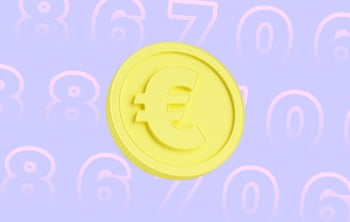By Maxine Hess
Writer | WhatsApp marketer | Creative
charles features
,Guides
Is WhatsApp Business suitable for large global businesses? Here's an intro to WhatsApp and enterprise businesses.
If you're a CMO, digital lead or CRM head at an enterprise, it's likely you're watching the growth of WhatsApp for businesses with interest.
You might be thinking of starting a WhatsApp channel or investing in WhatsApp software, but are still unsure if it's worth it – or how to put together the business case. If so, we've gathered some information together to help you make your decision.
In this article, we explain what WhatsApp for enterprise means, the benefits, the challenges, the costs, common WhatsApp enterprise misperceptions and use cases. You'll also learn the practicalities of how to start and manage a WhatsApp channel.
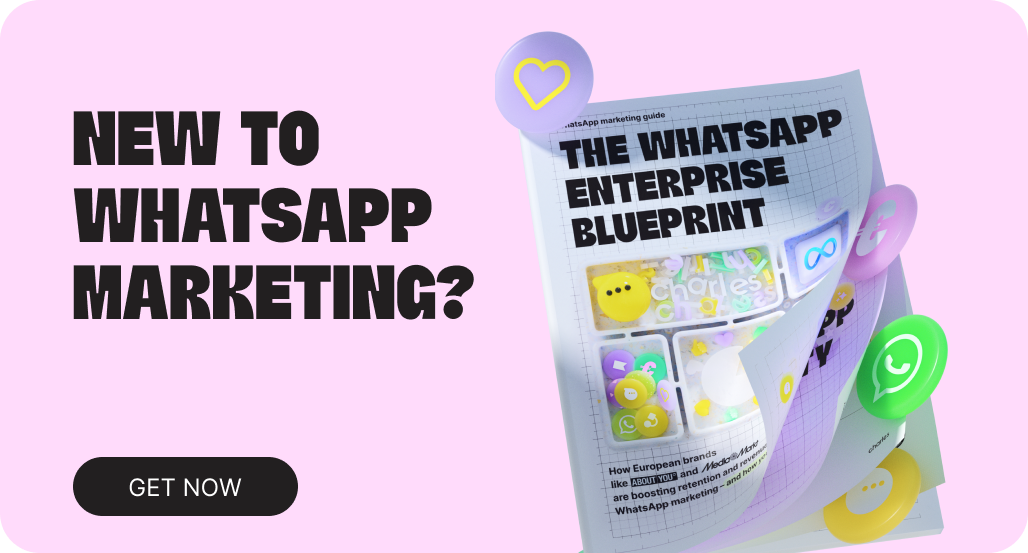 Download your free 60-page guide to the WhatsApp opportunity in Europe and how brands like Jack Wolfskin and Dermalogica use WhatsApp
Download your free 60-page guide to the WhatsApp opportunity in Europe and how brands like Jack Wolfskin and Dermalogica use WhatsApp
What is WhatsApp for enterprise?
WhatsApp for enterprise is simply the use of WhatsApp by enterprise companies to promote their business and communicate with customers.
To start a WhatsApp channel, businesses use WhatsApp Business – it's not allowed with a private WhatsApp account. There are two ways to do this:
- Through the WhatsApp Business app (free, for small businesses)
- Through the WhatsApp Business Platform/API (comes with Meta fees and usually software fees, for medium to large businesses)
Enterprises should use the WhatsApp Business Platform/API. This platform can be used by an unlimited number of users and is capable of sending messages to an unlimited number of customers at at time. The free app can only be used to broadcast messages to a maximum of 256 contacts at a time.
The platform offers rich functionality to ensure enterprises can operate a WhatsApp channel successfully: such as automation and analytics.
The benefits of WhatsApp for enterprises
There are many benefits of communicating with customers on WhatsApp as an enterprise. These include:
- Additional channel to make sales: working together with email and other channels
- High open rates: for example Bears with Benefits sees 85% open rates
- Loyal customers: WhatsApp can be good for customer retention
- Engaging marketing: WhatsApp offers unique interactive experiences through automation
- Competitive advantage: at this early stage, it's possible your competitors aren't offering WhatsApp to customers yet
- Extensive reach: WhatsApp is the most popular messaging app in the world
- Resource savings: no need to build your own app when you can use a hugely popular app people already enjoy using
- Wider marketing mix: WhatsApp can slot in as part of your omnichannel strategy
An omnichannel strategy fosters not only a strong online presence, but also cohesive brand messaging that shows up during any customer interaction – whether it be on a mobile device or in-store. Why omnichannel is the future of commerce, eCommerce Fastlane
The challenges of WhatsApp for enterprises
Here are some potential drawbacks to be aware of:
- WhatsApp doesn't solve all business problems: if you're not getting enough traffic to your website, for example, WhatsApp is unlikely to solve this. Right now (in Europe anyway) WhatsApp is largely a retention channel.
- There isn't a huge amount of data yet: WhatsApp for businesses is a relatively new channel compared to email and others. Enterprises typically want to see large amounts of proof of concept from companies of a similar size and industry when starting something new.
- Change can take time: due to size and complexity, adding a new channel to an enterprise can take a little more time. We recommend testing a channel with 1 use case or in 1 country before rolling out further.
- GDPR compliance: enterprises based in the EU, have to comply to the general data protection regulation (GDPR: DSGVO in Germany). This requires a careful eye.
Reasons our enterprise customers start with WhatsApp
Enterprises need to feel safe moving into a new area, and the decision-making process is complex. Reasons we've heard from enterprises that they start with WhatsApp:
- To stand out: from slower moving competitors who aren't yet in WhatsApp
- The financial incentive was compelling: we're seeing an average revenue per recipient (RPR) of €1.88* and a return on ad spend (ROAS) of 16.6X on average**
- Email isn't working as well as it was: with low engagement and complexity
- Advertising agency recommended it: they'd seen its success elsewhere and felt it was a new creative blank canvas
- The internal innovation team recommended it as they identified it as an opportunity
- They found the right use case to test it out, such as friend referrals or upcoming product launch
For some it was as simple as: "our customers all use WhatsApp to stay in touch with family and friends, it's time to let them use WhatsApp with us too."
The functionality WhatsApp offers enterprises
The WhatsApp Business Platform (API) is designed to handle large volumes of messages and enable businesses to scale.
Here are our top 3 useful functionalities for enterprise:
1. WhatsApp automation
Most companies use many different channels: email, Instagram, Google, Facebook and more. Most of this content can be repurposed for WhatsApp. Or WhatsApp can become part customer journey.
With automation it's even easier, which means enterprises don't have to invest heavily in managing a WhatsApp marketing channel. The WhatsApp API makes it possible to set up automated conversational flows that run by themselves.
This also protects brand reputation as messages can be standardized – using the same tone, information and format.
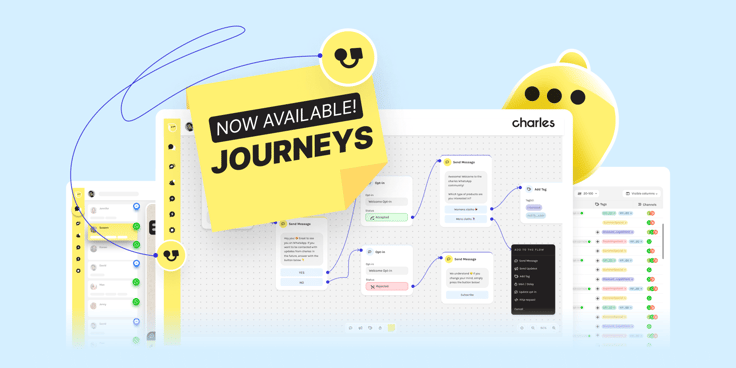
With our automation feature, Journeys, brands can set up automated WhatsApp flows
How WhatsApp automation works
-
- Conversation trigger: customer sends a keyword/trigger word to a company's WhatsApp number via an automatically generated message (you can generate a "wa.me" link for this)
- Automated response: a pre-written message is sent to the customer
- Conversation continues: the message can contain links for a customer to tap to generate more responses via buttons or lists – or you can send another automatic message after a time delay
- Conversation ends: the conversation can lead to a sale via links like: personalized product suggestions, pre-filled checkout, product page and exclusive sale page
2. WhatsApp marketing campaigns
In 2018, when WhatsApp Business was launched, it could only be used for customer support. Businesses couldn't send messages to customers whenever they wanted, they could only reply to incoming messages from customers.
In 2022, WhatsApp made it possible for businesses to send out "business-initiated" promotional messages. This opened up more a greater opportunity for businesses. As WhatsApp messages come with fees, making sales is perhaps more important in WhatsApp than any other channel.
WhatsApp marketing messages (sometimes called WhatsApp newsletters) can help drive revenue for enterprise brands through a variety of use cases, including:
- Discounts
- Seasonal campaigns
- Competitions
- Quizzes
And they can help build relationships brand messages like:
- NPS score surveys
- Product finders
- Brand building (e.g. describe your skin and find your best skincare routine)
We advise our customers to send no more than 2-3 marketing messages per month to per person, and to make them highly personalized to a customer's preferences and behavior. Campaigns should be targeted to customer preferences and only sent if a customer has given you proper consent.
3. WhatsApp integrations
The WhatsApp Business API can integrate with your current CRM and service platforms to offer the complete customer journey in WhatsApp.
The enterprise approach to WhatsApp
An enterprise may have some extra considerations to take into account compared to a small business when starting a WhatsApp channel:
- Internal decision-making process: there will likely be many stakeholders within an enterprise who will need to sign off on a WhatsApp channel. And before this, a detailed business case will need to be made. So for enterprises, the time to get started with a channel can be slower, even if onboarding is fast.
- Resources to manage a channel: an enterprise WhatsApp channel will be managed across teams and possibly timezones. It will likely also form part of many different company strategies. Enterprises will need to work out how this will impact operating costs.
- Maintaining brand reputation: though the internal WhatsApp set-up may be disparate, for the customer it should be a seamless, positive, consistent brand experience. What measures do you need to put in place to ensure the same tone of voice, formatting, messaging and approach?
- Working with external parties: enterprises often work with external agencies on campaigns – sometimes for customer service too. They'll need to think about what access to give other companies and how to maintain consistency. What's more, if teams chatting with customers are in different countries, this may cause localization and data privacy issues, which brings us on to.
- GDPR compliance: this is a concern for all businesses, particularly those operating the EU. As an enterprise operating in different countries, protecting data privacy can be more complex.
Use cases of WhatsApp
Here are some common enterprise use cases of WhatsApp:
Product launches
WhatsApp is a fast, direct way to notify loyal customers about a new product.
Exclusive offers
Some customers use their WhatsApp channel to send WhatsApp-only offers and campaigns. For example, WhatsApp-only product releases, or the chance to chat with an influencer. This gives those who are in the channel a sense of exclusivity, and those who aren't a good reason to sign up.
Seasonal events
WhatsApp is the perfect place for quick, seasonal messages and campaigns. It could be a discount, a game, a competition or a giveaway. Engagement tends to be high on days like Valentine's Day, Black Friday, Singles Day and the Holidays.
Delivery updates
Many customers want to get updates about their order in WhatsApp. Many brands offer this possibility on their thank you page after a purchase, and boost subscriber numbers this way.
Referral programs
If you make a large percentage of new business through referrals, WhatsApp is the ideal channel for this. It's easy to send codes to customers and for them to forward these to friends.
Costs of WhatsApp for enterprises
Meta charges fees for WhatsApp messages. You'll also pay platform fees if you're partnering with a WhatsApp Business Solution Provider. It's important to remember to factor these costs into your cost center.
For more on costs, see: WhatsApp pricing.
How to choose a WhatsApp enterprise software provider
Any WhatsApp Business Solution Partner working with enterprises needs to be highly flexible and offer a more tailored approach. At the basic level, this should include:
- Easy-to-use software platform: that's highly scalable and offers advanced automation
- GDPR compliance: helped by software features and advice from your provider
- Excellent support: to help you get the most out of WhatsApp
In addition, the provider should:
- Recommend use cases: first, find a narrow use case for you to start your WhatsApp channel, then help you expand it across the business
- Offer integrations: it should offer CRM integrations like Emarsys, service integrations like Zendesk and offer custom integrations as necessary
5 steps to start with WhatsApp marketing
These are the key steps in starting with WhatsApp as an enterprise:
1. Choose a WhatsApp Solution Partner
Unless you build the software yourself, you'll need the services of a software provider, Tech Provider or Tech Partner to access the WhatsApp Business API.
2. Get a phone number
You'll need a new phone number to start your WhatsApp Business channel.
3. Get Meta Business Manager
If you already have a Facebook page, it's likely you have this. If not, your software provider will help you with this.
4. Set up your WhatsApp Business profile
This will include your name, description, address, image and website. Again, your provider will help you with this.
5. Get onboarded and integrated
Your provider should train you in how to use its software and share WhatsApp best practices to ensure the long-term success of your channel.
Why are more enterprises joining WhatsApp?
WhatsApp Business has, until recently, been the preserve of small to medium businesses, with just small number of innovative enterprises venturing into WhatsApp. We see that WhatsApp is growing among enterprises because?
Innovators understand the power of WhatsApp
Just a few years ago, WhatsApp was a private consumer platform. A place for for friends, family and sports/school groups. Now, consumers in Europe are becoming more familiar with WhatsApp as a business channel. With more consumers trusting WhatsApp as a business, innovative enterprises are starting to take note and get started before their competitors.
Customer experience is king
As Steve Jobs said: “You’ve got to start with customer experience and work back toward the technology, not the other way around.” WhatsApp offers ease of communicating with enterprise brands, as well as the convenience of an app customers already have on their phones. In addition, all conversations, whether service, marketing or sales are all connected in one thread. Lastly, WhatsApp automation offers the possibility to provide customers with a unique, interactive experience.
The results are there
There are now several years of results from brands using WhatsApp as a marketing platform. As mentioned, key KPIs we've seen are an average of €1.88 RPR* and ROAS of 16.6X.** See case studies here.
The demand is there
Businesses are looking for more personal ways to communicate with customers and build long-term relationships. Social media is a crowded landscape with algorithms that can be hard to crack.
Meanwhile, consumers want quicker answers and more personal communications. Many are tired of impersonal emails, faceless retail companies and marketing complexity. They increasingly want to use messaging apps to communicate with businesses.
It's a cutting edge
Meta is investing heavily in WhatsApp Business and software platforms are becoming more advanced, with ever more powerful automation, detailed analytics and comprehensive integrations – to drive revenue and retention.
It's a competitive edge
Many enterprises are not yet on WhatsApp.
Want to know more about WhatsApp and enterprise?
Get in touch with us through the demo form and our enterprise team will get back to you soon.
*€1.88 median customer revenue per recipient (RPR) from Dec 23 to May 24 across all charles' customers, across different verticals and with different AOVs, with enabled revenue tracking.
**16.6X return on ad spend (ROAS) = revenue per recipient (RPR)/marketing conversation fee, Meta Germany = €1.88/€0.1131 (excludes charles platform costs). RPR used is €1.88 median customer RPR as described above.
These figures are purely indicative information – legal disclaimer: This analysis only provides an initial and purely indicative information based on historical platform data from our customers and using standard valuation methodologies. A reliable or definitive sales or revenue forecast cannot be derived from the result, either currently or in the future. Further, neither has charles independently verified the data and assumptions used in these analyses, nor made an undertaking to update the underlying data or assumptions meaning that such information may become outdated which will clearly impact the forecast result.
Disclaimer: the information in this article is based on our experience and expertise and is not offered as legal or data privacy advice. For full information on your legal obligations under GDPR, please go to the European Commission's official GDPR site.
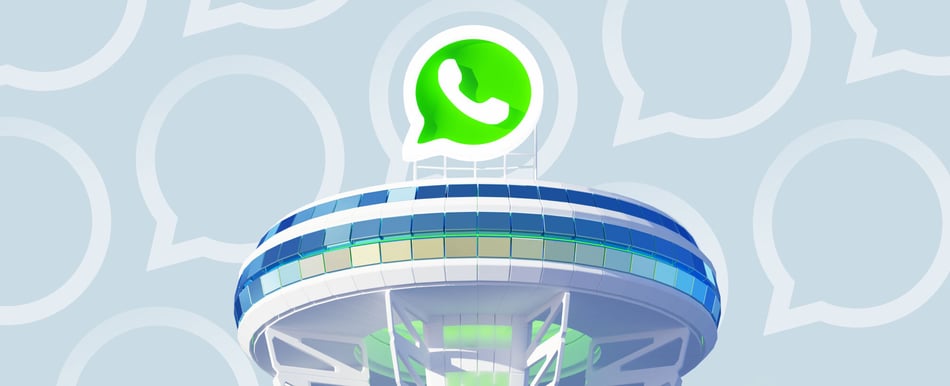

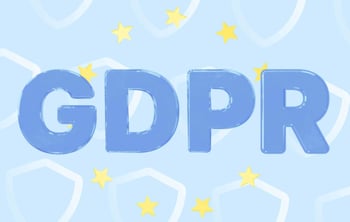
![WhatsApp marketing 101: a guide [+WhatsApp campaign examples]](https://www.hello-charles.com/hs-fs/hubfs/WA%20marketing%20preview%20%281%29.jpg?width=350&height=222&name=WA%20marketing%20preview%20%281%29.jpg)
